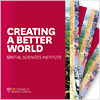Each summer since 2003, diverse groups of scholars have gathered in Italy and Spain to explore the frontiers of the spatial revolution — how modern computational tools and concepts applied to a georeferenced 3D environment can address difficult social problems. The topics of these meetings have later emerged in our everyday lives: volunteered geographic information has become the community volunteered maps developed after natural disasters, spatial data infrastructure has become the backbone of smartphones pushing driving directions to millions of users.
Now, for the first time, the Vespucci Initiative, which convenes these high-level meetings with the support of public and private organizations such as Esri and the Association of American Geographers, has selected a North American host — University of Southern California Spatial Sciences Institute — for one of the summer meetings, known as Vespucci Institutes. (Amerigo Vespucci was the Italian explorer, navigator, and cartographer after whom the Americas are named.).
The summer 2013 Vespucci Institute on Population, Health, and Place will take place at the beautiful facilities of the Boone Center for Science and Environmental Leadership at the Wrigley Marine Science Centeron Catalina Island. USC faculty Myles Cockburn and John Wilson will facilitate the meeting, along with colleagues Geoffrey Jacquez (SUNY-Buffalo), Martin Raubal (ETH Zürich).
The meeting will attract experts from around the world to interact in a setting that has been described as “Camp David for the Environment.” The program will feature presentations, case studies, methodological critiques, and the opportunity to work collaboratively on projects, be they journal articles, project and funding proposals, or business plans.
The Vespucci Institutes are built around a deliberative process that favors thinking over tinkering and critical debate over passive listening. It is a “slow” learning approach emphasizing comprehension and meaningful interaction over consumption of mountains of material. (For more on the Vespucci approach, read the essay Slow Food for Thought and Body).
To learn more about the Vespucci Institute on Population, Health, and Place, please see vespucci.org/presentation.



